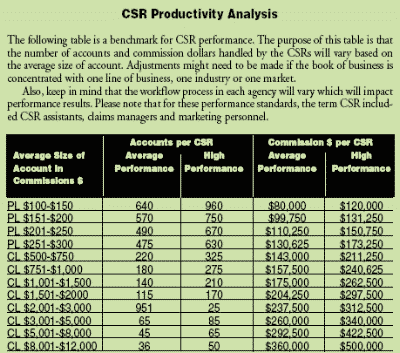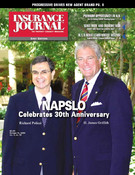Job compensation
The next big question is what is fair compensation? The first criterion is to make sure it is affordable compensation. Hiring the world’s best CSR is not a good idea if the cost will sink the company. Compensation needs to be in line with job duties and responsibilities.
A good way to look at compensation is to do a quick reality check. Simply take the commission dollars to be handled by a CSR and subtract compensation costs (include taxes and benefits) to determine what the “spread” is for that specific position.
The next step is to evaluate if the remaining dollars are enough to cover producer compensation, overhead and provide a fair return to the owners. This analysis will have to rely on a “gut feel” rating. Unfortunately there are no reliable benchmarks on what the spread should be since there are too many variables from agency to agency.
The bottom line for calculating the spread is to see if there is a fair return to owners after expenses are taken out. A low return or loss will require an adjustment to compensation (to the owners, CSRs or the producers) or somehow overhead costs would need to be lowered. If adjustments are not feasible, then management must think about rehabilitating or getting rid of that specific book of business.

The analysis of affordable compensation is important; however, what an owner may feel is appropriate unfortunately may not be the same as what the agency will need to pay. The strong economy of the late 1990s has had a tremendous impact on what the prevailing wages are today in much of the country.
Compensation paid to CSRs varies tremendously throughout the country. Agencies in rural areas in the middle of the U.S. might find a decent CSR for about $20,000. Urban areas, especially in California and New York, might have to pay more than $50,000 for a mediocre commercial lines CSR. Often, the local chapter of the Association for Professional Insurance Women will have a good grasp on the local going rates for CSR compensation. Oak & Associates has completed a compensation survey for California agencies. Contact us for a complimentary copy.
What must be noted is that salaries have clearly gone up in recent years but there has not been a corresponding increase in the commission dollars handled. Major reasons for the stagnant size of the CSR’s book of business are the continued soft market and lower commissions paid by the carriers.
It also seems that automation has actually increased the CSR workload because everyone expects more information and service. Also carriers expect the agencies to do more of the their work without getting paid for it.
A final thought
Hiring and keeping a good CSR is both an art and science. Review the numbers to make sure all the statistics are in line, but make sure the subjective side is also included in the process.
It often proves true that it is better to hire a well-qualified CSR and pay them more rather than just filling the position with a low paid, not-so qualified person. Highly productive CSRs handle more work with less supervision and thereby can save expenses in the long run.
For the typical agency, the quality of the CSR determines the quality of the service and the quality of the agency overall. The path to reaching top performing agency status is not easy, but the right CSRs are necessary for the journey.
Bill Schoeffler and Catherine Oak are partners in the international consulting firm, Oak & Associates. The firm specializes in financial and management consulting for independent insurance agents and brokers, including valuations, mergers acquisitions, clusters, sales and marketing planning as well as perpetuation planning. They can be reached at (707) 935-6565, by e-mail at bill@oakandassociates.com, or visit www.oakandassociates.com.
Was this article valuable?
Here are more articles you may enjoy.


 Insurance Broker Stocks Sink as AI App Sparks Disruption Fears
Insurance Broker Stocks Sink as AI App Sparks Disruption Fears  BMW Recalls Hundreds of Thousands of Cars Over Fire Risk
BMW Recalls Hundreds of Thousands of Cars Over Fire Risk  How One Fla. Insurance Agent Allegedly Used Another’s License to Swipe Commissions
How One Fla. Insurance Agent Allegedly Used Another’s License to Swipe Commissions  Florida Engineers: Winds Under 110 mph Simply Do Not Damage Concrete Tiles
Florida Engineers: Winds Under 110 mph Simply Do Not Damage Concrete Tiles 



